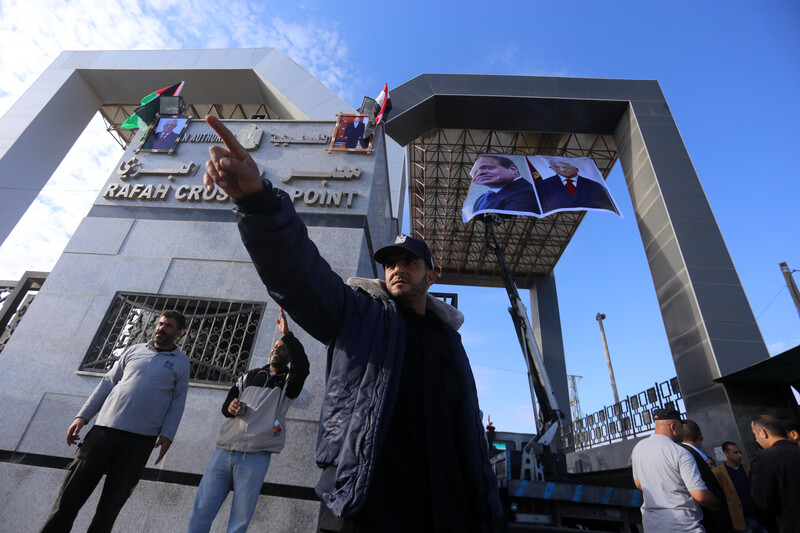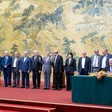Power Suits 1 December 2017

With Rafah crossing remaining closed, a new Palestinian reconciliation agreement has failed a first key step.
APA imagesIt hasn’t taken long for old obstacles blocking reconciliation between Hamas and Fatah to become the same old obstacles blocking reconciliation.
Friday, 1 December, should have marked the date of the handover of administrative control in Gaza from Hamas to the West Bank-based Palestinian Authority. But in a terse joint statement on Wednesday, Hamas and Fatah said they had agreed to delay the handover until 10 December.
This came after angry civil servants hired by Hamas to oversee the administration of the Gaza Strip on Tuesday confronted employees of the West Bank Palestinian Authority under Mahmoud Abbas as they tried to reassume their old jobs after 10 years. The latter had been ordered to take up their previous posts from Ramallah, which is keen to be seen to have taken back control of Gaza.
But this came without agreement with Hamas and without resolution as to what to do with the people – somewhere between 40,000 and 50,000 – who had been employed in the intervening decade.
The fate of all these civil servants has become a major stumbling block in reconciliation negotiations between the two factions. And while a breakthrough seemed to have been reached in October, the devil, as ever, has been in poorly worked out details.
But this is not the only indication that a much hoped for unity agreement is looking ever unlikelier.
Much talk, little action
It is now well over a month since a preliminary reconciliation agreement between the two estranged Palestinian factions was signed in Cairo to great fanfare. Since then, what little has happened has primarily been from one side, Hamas, and what hasn’t happened has far greater significance.
What has happened is this: Hamas has disbanded the administrative committee it set up in the spring to govern Gaza. Hamas has withdrawn its people from Gaza’s crossings to allow West Bank Palestinian Authority officials to take over. Hamas is well on the way to creating a buffer zone with Egypt to stop people smuggling themselves in and out of the Sinai in response to Egyptian pressure. And, finally, Hamas has arrested suspected Salafi militants mostly at the behest of Cairo.
What hasn’t happened is this: Abbas has not lifted the sanctions on Gaza that he imposed in April in response to the advent of Hamas’ administrative committee. These sanctions mean the PA is not paying Israel for electricity or fuel for Gaza’s only power plant. On average, Palestinians in Gaza enjoy only some four hours of electricity a day. They mean a cut of up to a third of the salaries of the above mentioned civil servants, an important source of revenue in the impoverished Gaza Strip. And they mean funding for medicines and health care for Gaza remains slashed.
Hamas has meanwhile not disarmed and is not going to. This in spite of Israeli demands that Hamas’ military wing, the Qassam Brigades, disband before it will negotiate with any unified Palestinian polity, a demand with which Abbas is apparently acquiescent.
What really matters
What also hasn’t happened is any change in the policy at the Rafah crossing to Egypt. Since the preliminary agreement was signed on 12 October, in fact, the Rafah crossing has been open a grand total of just three days.
And this is the most pressing priority of all. Two million people in Gaza are on the brink of a humanitarian disaster. All the major indicators – crumbling infrastructure, from sewage to health to housing, soaring poverty and unemployment rates, overcrowding and enforced economic and physical isolation – suggest that it won’t be long before Gaza is over that brink, indeed that it is a miracle it isn’t already.
The great promise of reconciliation is that it will bring about an opening to the outside world that will ease this miserable picture, allow people to travel to seek medical treatment, job opportunities, education or, indeed, just to get out, and to bring in much needed materials to rebuild the battered strip.
The money, in theory, is there.
Over to Cairo
Opening Rafah is a decision that can only be made in Cairo. Egypt has played the leading mediating role between Fatah and Hamas and will be loath to see negotiations fail at this stage. But Cairo also has its own interests, primarily in coming to grips with what has become a full-blown and deadly Sinai insurgency. It has asked for, and received, Hamas’ help in this. But Cairo also knows that to count on continued cooperation, there is only one thing Hamas wants: an open crossing.
Cairo has tried to give itself international cover with the unity agreement. PA control of Gaza’s crossings would ensure that Israel, which is intent on bringing Hamas to its knees whatever the human cost, has less of a case to bring to international players.
But if Abbas proves unwilling or unable to proceed with a realistic unity agreement, there is a fallback option, the agreement Hamas struck with Abbas’ main Fatah leadership rival Muhammad Dahlan that also promised an opening of Rafah.
That agreement was also mediated by Egypt and waits in the wings where Dahlan is biding his time. The last thing Abbas wants is to see a rival he thought he had gotten rid off last year, return through the backdoor and as the savior of Gaza to boot.
Egypt too would prefer to have Abbas on board, if only for the cover he provides. But Egyptian President Abdulfattah al-Sisi has proven willing to go his own way before. Cairo can go down the Dahlan route if necessary.
And it is beginning to look necessary. The less likely it looks that Rafah will be properly opened, the less an incentive Hamas has to play ball. With anyone. And Cairo is unlikely, after all this effort, to want to go back to square one in its relations with Gaza.





Comments
Abbas
Permalink Eva K Coombs replied on
Abbas is way past his due date, hope Hamas hangs tough, meantime the rest of the world is waking up to the scandal which is Israel.....